Karis Name Meaning & Details
Origin, Popularity, Numerology Analysis & Name Meaning of Karis
Discover the origin, meaning, and cultural significance of the name KARIS. Delve into its historical roots and explore the lasting impact it has had on communities and traditions.
Name
Karis
Gender
Female
Origin
Greek
Lucky Number
4
Meaning of the Name - Karis
Karis is a feminine name of Greek origin meaning 'grace' or 'kindness.' It embodies elegance and compassion, reflecting the qualities associated with the mythological Three Graces.
Karis - Complete Numerology Analysis
Your Numerology Number
Based on Pythagorean Numerology System
Ruling Planet
Uranus (Rahu)
Positive Nature
Strong sense of order, loyal, practical, and disciplined.
Negative Traits
Stubborn, overly serious, rigid, and prone to feeling restricted.
Lucky Colours
Blue, gray.
Lucky Days
Saturday.
Lucky Stones
Blue sapphire.
Harmony Numbers
1, 7, 8.
Best Suited Professions
Managers, engineers, accountants, organizers.
What People Like About You
Dependability, discipline, practicality.
Famous People Named Karis
Karis Teetan
Horse Racing Jockey
One of Hong Kong's leading jockeys with numerous major race victories
Karis Jochen
Musician/Composer
Notable composer and performer in contemporary classical music
Karis Wilde
Author
Published poet and writer focusing on feminist literature
Name Variations & International Equivalents
Click on blue names to explore their detailed meanings. Gray names with will be available soon.
Cultural & Historical Significance
Throughout Greek philosophy and literature, charis was considered a fundamental quality that enhanced human relationships and social harmony. The concept extended beyond personal attributes to encompass the reciprocal nature of kindness and favor in Greek society. In Christian contexts, the name also connects to the concept of divine grace, adding another layer of spiritual significance. The enduring appeal of Karis across centuries demonstrates how this ancient concept of grace continues to resonate with contemporary values of kindness, beauty, and emotional intelligence.
Extended Personality Analysis
Individuals named Karis are often perceived as graceful, compassionate, and emotionally intelligent. They tend to possess a natural elegance in their movements and interactions, combined with a genuine warmth that makes others feel comfortable and valued. Karis personalities typically exhibit strong empathy and intuition, allowing them to understand others' perspectives and respond with kindness and tact. They often have artistic sensibilities and appreciate beauty in various forms, from nature to human expression.
While they may appear gentle, many Karis individuals possess inner strength and resilience, able to navigate challenges with poise and determination. Their grace extends beyond mere appearance to encompass their approach to problem-solving and interpersonal relationships, making them excellent mediators and supportive friends. They tend to be good listeners who offer thoughtful advice and create harmonious environments wherever they go. The combination of their intuitive understanding of people and their natural elegance often makes them successful in careers involving communication, arts, counseling, or any field that values emotional intelligence and aesthetic sensibility.
Modern Usage & Popularity
Karis has seen steady popularity in English-speaking countries since the late 20th century, particularly among parents seeking names with classical roots but contemporary appeal. While not among the top 100 names in most countries, it maintains consistent usage due to its elegant sound and meaningful origin. The name has gained traction in the United States, United Kingdom, Canada, and Australia, often chosen by parents who appreciate Greek mythology or want a name that conveys grace and kindness. Its popularity has remained stable rather than trending dramatically, making it a timeless choice that avoids being overly common while still being recognizable and easy to pronounce. In recent years, there has been a slight increase in usage as parents seek names that are both distinctive and meaningful, with positive connotations that align with contemporary values of empathy and emotional intelligence.
Symbolic & Spiritual Meanings
Symbolically, Karis represents the embodiment of grace in its fullest sense—not merely physical elegance but the grace that manifests in kindness, generosity of spirit, and the ability to bring beauty and harmony to one's surroundings. The name carries connotations of divine favor, artistic inspiration, and the transformative power of kindness. In metaphorical terms, Karis symbolizes the idea that true grace involves both giving and receiving kindness, creating a cycle of positive energy that enriches relationships and communities. It represents the balance between strength and gentleness, suggesting that true power lies in compassionate action and emotional intelligence rather than force or aggression. The name also symbolizes the interconnectedness of beauty, creativity, and human connection, reflecting the original Greek concept that grace was essential for both artistic excellence and fulfilling social relationships.

